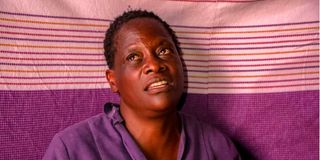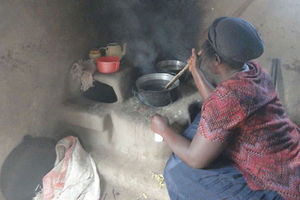
Radisson Blu Arboretum - Nairobi guests and employees take part in the Christmas Cake Mixing on October 19.
As evening approaches, the chandeliers of luxury hotels shimmer and glow, welcoming affluent clients who eagerly anticipate a lavish Christmas dinner.
Tables with fine china and shimmering candles set the stage for an evening of opulence, where the crème de la crème indulge in gourmet delicacies and vintage wines, enveloped in extravagance.
A few miles away, the harsh realities of the country’s economic disparity cast a shadow over the festive season for tens of thousands.
Families in financial challenges find themselves navigating the daunting task of affording a modest meal, with a budget that barely stretches to Sh100.
For Sandra Musengya, a 35-year-old single mother of three in Mukuru Kwa Njenga, Nairobi, Christmas is a tapestry of cherished memories – laughter echoing in the humble abode, children’s eyes shining with joy at the sight of treats and a home imbued with warmth and love.
However, as the cruel twists of life would have it, Christmas has changed from a day of jubilation to a reminder of endless hardship.
Haunting silence
“What does Christmas mean to me these days? To be honest, it feels like just another day that is weighing me down with hardships. The country’s economy is bad. I used to love the festive season. There was joy, laughter and merry-making. We would create memories,” Ms Musengya says.
“How can I now find joy when the only thing my children have on that day is black sugarless tea? It breaks my heart to think that the magic of Christmas has faded into such stark reality.”
The melodies that once filled the air now resonate with a haunting silence, punctuated only by Ms Musengya’s muffled sobs as she grapples with what she and many others in the densely populated neighbourhood face.
With every passing moment, the weight of the occasion bears down on Ms Musengya’s shoulders.
The task of providing a semblance of celebration for her children is an insurmountable challenge.
“I have no plans for December 25 and January 1. Why should I? Every passing day is a battle to ensure my children have a roof over their heads and to keep the electricity running,” she says.

Sandra Musengya, 35 a mother of three at her home in Mukuru Kwa Njenga, Nairobi, on Saturday, December 23, 2023.
“How can I even think of buying a packet of wheat flour to make chapati when I cannot afford cooking oil? We cling to hope, thanking God for every small blessing and for how far He’s brought us. Let us be real. Whatever little we scrape together will be our celebration.”
Narratives from the “leafy suburbs of Nairobi” paint a contrasting picture.
Also Read: Last minute places to usher in the new year
At the Radisson Blu Arboretum, for instance, the festivities peak with dinner priced at Sh15,000 for New Year’s Eve and Sh7,500 during Christmas.
“We’ve been mindful of the challenging economic times and, as a result, significantly reduced our prices,” says Mercy Njiru, the cluster marketing manager at Radisson Group Nairobi
“At the Arboretum, our comprehensive brunch and activity package costs Sh9,000 per person, also with a 50 per cent discount for children. We’ve curated packages to suit everyone’s budget.”
Radisson Blu Arboretum offers a brunch with several activities tailored for children.
“The brunch provides a memorable experience without straining your wallet. Similarly, Parkinn by Radisson offers a comparable experience at affordable rates,” Ms Njiru says.
Early bird bookings
Brunch at Parkinn by Radisson is priced at Sh6,000 per person, with a 50 per cent discount for children from 11am to 5pm.
Dinner offerings come with differences in price. At the Arboretum, dinner is priced at Sh7,500, while at Parkinn, it’s ala carte for Shh3500.
“Even more exciting, we are organising a grand party at the Arboretum. The evening will begin with a dinner and culminate in a vibrant after-party. Early bird bookings are priced at Sh12,000, while on-the-day bookings will be Sh15000. At Parkinn, our ultimate party package includes a DJ and dinner, all for Sh6,500,” Ms Njiru adds.
At Mövenpick, the essence is in choice and value.
“For our dining experience, guests have the opportunity to indulge in an à la carte menu, with prices varying from Sh4,000 and Sh5,000 per person,” says Randy Ngala, the Mövenpick PR and marketing manager.
“For those opting for brunch, the cost is set at Sh6,000 with non-alcoholic beverages and Sh6,500 for options that include drinks. Rest assured, our offerings are curated to guarantee a memorable and bespoke dining experience for everyone.”
For Ms Musengya and other residents of Mukuru Kwa Njenga slum , Sh15,000 means more than money.
It will be a chance to rebuild her life, she says.
“If I were handed that amount now, it wouldn’t just be money; it would be the key to resurrecting my long-held dreams. I would reinvest in my kibanda business without a second thought,” she says.

Nancy Natecho 40, a mother of three at her home in Mukuru Kwa Njenga, Nairobi, on Saturday, December 23, 2023.
“I would buy more saucepans to add to the two that I already have. I would go back to cooking. The money you are talking about wouldn’t just secure my monthly rent of Sh2,000 and settle my Sh400 electricity bill. It would reignite my passion.”
With Sh15,000 Ms Musengya says she’d buy her family’s essential supplies, including cooking gas, a thermos flask for steaming tea, plates, spoons and other kitchenware.
“I would also buy maize and beans for my neighbours and the community. I will use a portion of the money to pay my children’s school fees, ensuring that their future remains promising,” she says.
“But that is not the only thing I would do. I have vision, hope and commitment to my children’s dreams. They need to be empowered so as to face the future with determination.”
Ms Nancy Natecho, a 40-year-old disabled widow raising three children, thinks Christmas has become a stark reminder of the glaring gulf between wealthy and poor families.
Washing clothes
As she switches on a radio and hears programmes and tales of celebrations, Ms Natecho is acutely reminded of the stark disparities that define her existence, reinforcing the poignant realisation that life remains deeply unequal.
For those on the margins, the situation is unbearable.
“Our Christmas plans are rather modest. We will make do with whatever we can gather, even if it means relying on simple meals like ugali and sukuma wiki,” Ms Natecho says.
“Getting even Sh100 is a herculean task. I used to earn my living by washing clothes for families in neighbouring estates but the current economic climate means the families have opted to handle such tasks themselves. The situation has made it difficult for people like me to sustain that as our source of income.”
So, what if she stumbles on Sh15,000 today?
Natecho says with such a “colossal” amount, she would open a shop to sell basic items like bread, salt, soap, cooking oil and sugar.
“If a miracle happens and I get Sh15,000,I will open a small shop stocked with daily necessities. Running such a venture would be manageable, considering my physical limitations,” Ms Natecho says.
“Despite many challenges, my daughter has shown remarkable resilience and determination. She pays for her education and does not rely on me. I have always wanted to support her academic journey but circumstances constrain me.”
Pausing momentarily to gather her thoughts, Ms Natecho’s voice quivers with emotion as she envision a bright future for her household.
“With that Sh15,000, I would not only realise my dream of entrepreneurship but also alleviate the financial burden on my daughter. I would use the proceeds from the business to support her education, ensuring she completes studies with dignity,” Ms Natecho says.
“I am also committed to securing the future of my younger children, providing them with opportunities that I only dream of. Every Shilling would be a step closer to transforming our lives and forging a path filled with hope, resilience and boundless possibilities.”










